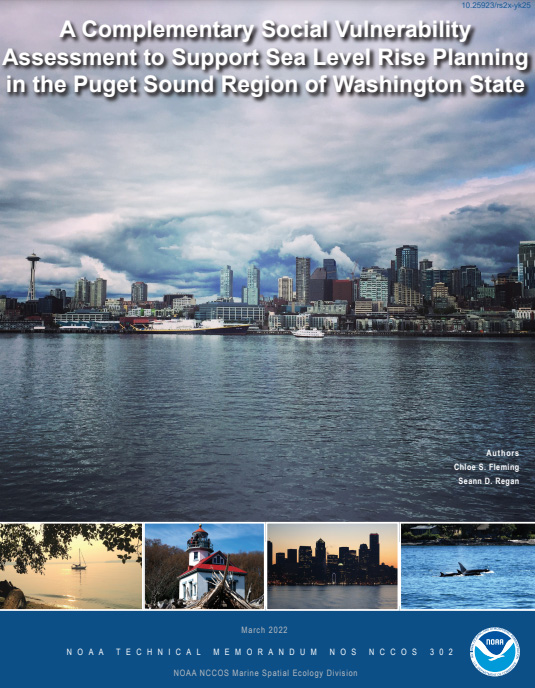
Coastal communities are increasingly vulnerable to climate-driven impacts, such as sea level rise and coastal erosion. To address these risks in the Puget Sound region of Washington, Washington Sea Grant and Coastal Geologic Services (CGS) are leading a sea level rise vulnerability assessment for use by coastal managers and decision-makers. In support of this effort, NCCOS researchers partnered with Washington Sea Grant and CGS to develop a complementary social vulnerability assessment for communities within the Puget Sound region.
Using methods derived from NCCOS’s vulnerability assessment framework, NCCOS social scientists identified and assessed social vulnerability at the Zip Code Tabulation Area level within the Puget Sound drainage basin. The team used a secondary data approach to identify seven components of social vulnerability that include themes such as diversity, income, education, age, isolation, access to social services, housing, life satisfaction, and belonging. Collectively, these comprise a composite social vulnerability index that can be used to inform restoration activities and other uses by the Puget Sound Partnership and regional stakeholders by identifying areas where co-benefit of adaptation, mitigation, and environmental justice may occur.
Beyond its integration within the larger vulnerability assessment, the maps and data generated through this assessment can be used as stand-alone products to inform other efforts in the Puget Sound region and offer tools for communities and other users to summarize needs and advocate for resources for environmental justice and adaptation in the face of climate change and sea level rise.
To learn more, visit the project page.
 Official websites use .gov
A .gov website belongs to an official government organization in the United States.
Official websites use .gov
A .gov website belongs to an official government organization in the United States. Secure .gov websites use HTTPS
A lock or https:// means you’ve safely connected to the .gov website. Share sensitive information only on official, secure websites.
Secure .gov websites use HTTPS
A lock or https:// means you’ve safely connected to the .gov website. Share sensitive information only on official, secure websites.